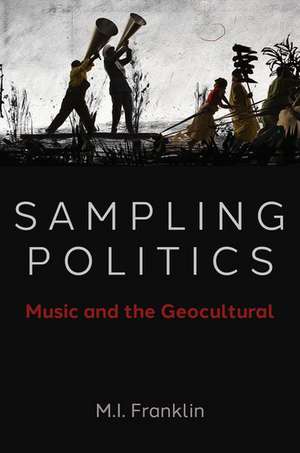Sampling Politics: Music and the Geocultural
Autor M. I. Franklinen Limba Engleză Paperback – 13 oct 2021
Preț: 188.59 lei
Preț vechi: 205.14 lei
-8% Nou
Puncte Express: 283
Preț estimativ în valută:
36.09€ • 37.54$ • 29.80£
36.09€ • 37.54$ • 29.80£
Carte disponibilă
Livrare economică 14-20 martie
Preluare comenzi: 021 569.72.76
Specificații
ISBN-13: 9780190855482
ISBN-10: 0190855487
Pagini: 360
Dimensiuni: 155 x 236 x 23 mm
Greutate: 0.52 kg
Editura: Oxford University Press
Colecția OUP USA
Locul publicării:New York, United States
ISBN-10: 0190855487
Pagini: 360
Dimensiuni: 155 x 236 x 23 mm
Greutate: 0.52 kg
Editura: Oxford University Press
Colecția OUP USA
Locul publicării:New York, United States
Recenzii
The title establishes the framework: the act of sampling signifies not only a musical but also a political intention. As one would expect, the book examines many instances of sampling, but the global and historical breadth of the music considered here is impressive and even a bit daunting.
This book beautifully explores the nuances of the cultural appropriation, misrepresentation, and erasure arising from unauthorized sampling in the music industry, and offers a deep dive into the theory and performance of the sampled non-Western musical traditions. A thoroughly researched, highly informative and engaging book.
Sampling Politics is an innovative, thought-provoking, and thoughtful book. It helps us observe the intricacies of border crossing in the world of music as the fissures of contemporary politics. The recognition of the self within the other forms part of this politics, and in so doing allows us the 'interlocking sampling-timelines' so necessary to developing communities of practice. Distinguishing between relationships of music-in-the-making and music-in-the-taking, Franklin draws our attention to the everyday struggles of boundary un/making at the local, national, and global levels. In the contemporary political moment, when we seem more focused on the visual than the auditory, Franklin's book is a political corrective, urging us to listen closely, carefully, and most important of all, politically. I hope it will find a wide readership much beyond the study of politics and international relations.
Designed to provide music edification for an IR scholarly constituency, M. I. Franklin's superb book will serve well beyond that ambition. Extraordinarily knowledgeable about the musical fields it explores—treating sampling, cutting, remixing, re-textualizing—it makes connections that breach the boundaries of the theoretical thought world within which social science fields have been quarantined.
This book beautifully explores the nuances of the cultural appropriation, misrepresentation, and erasure arising from unauthorized sampling in the music industry, and offers a deep dive into the theory and performance of the sampled non-Western musical traditions. A thoroughly researched, highly informative and engaging book.
Sampling Politics is an innovative, thought-provoking, and thoughtful book. It helps us observe the intricacies of border crossing in the world of music as the fissures of contemporary politics. The recognition of the self within the other forms part of this politics, and in so doing allows us the 'interlocking sampling-timelines' so necessary to developing communities of practice. Distinguishing between relationships of music-in-the-making and music-in-the-taking, Franklin draws our attention to the everyday struggles of boundary un/making at the local, national, and global levels. In the contemporary political moment, when we seem more focused on the visual than the auditory, Franklin's book is a political corrective, urging us to listen closely, carefully, and most important of all, politically. I hope it will find a wide readership much beyond the study of politics and international relations.
Designed to provide music edification for an IR scholarly constituency, M. I. Franklin's superb book will serve well beyond that ambition. Extraordinarily knowledgeable about the musical fields it explores—treating sampling, cutting, remixing, re-textualizing—it makes connections that breach the boundaries of the theoretical thought world within which social science fields have been quarantined.
Notă biografică
M.I. Franklin is Professor of Global Media and Politics at Goldsmiths University of London.
